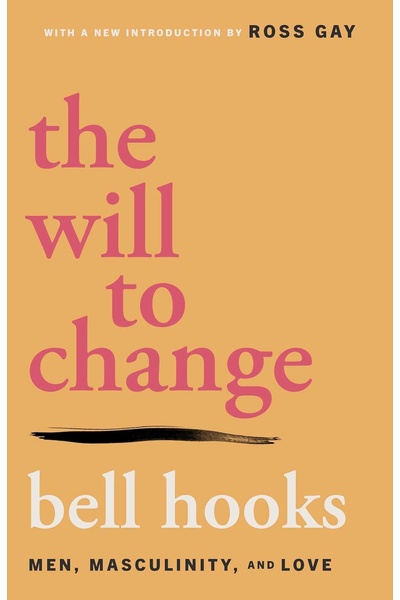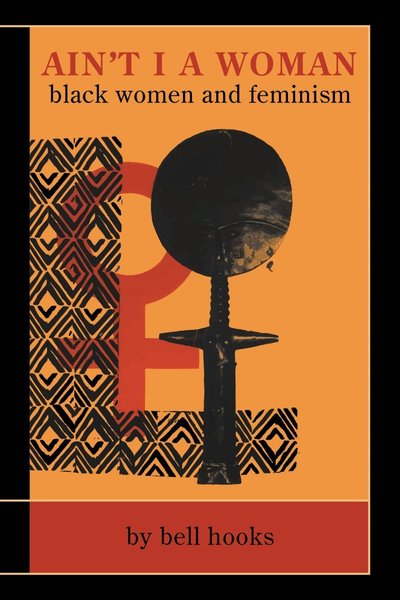The Will to Change: Men, Masculinity, and Love
Deeply analyzes how patriarchy harms men, explores how men can participate in feminist movements, and advocates for building new masculinity based on love and equality.

📝 Book Review
“The Will to Change” represents bell hooks’ groundbreaking work on the relationship between men and feminism, an insightful and empathetic book that presents a unique perspective on how patriarchy simultaneously oppresses women and harms men. With her characteristic profound analysis and warm prose, hooks presents a revolutionary viewpoint: true feminist liberation requires not only women’s awakening and struggle but also men’s participation and transformation. This book is not merely a critique of traditional gender relations but an active advocacy for building a more just and loving society.
When analyzing patriarchy’s dual harm, hooks profoundly reveals how this system creates systematic deprivation of men’s emotional lives. She points out that patriarchy, through a series of strict social norms and cultural expectations, prohibits men from expressing vulnerable emotions, suppresses their natural need for emotional connection, cuts off their ability to establish deep intimate relationships with others, and forces them to maintain emotional numbness.
This emotional deprivation not only causes internal pain and emptiness for men but, more importantly, it weakens men’s capacity as complete human individuals, making them unable to experience life’s richness and depth. hooks’ analysis reveals a profound paradox: while patriarchy grants men social privileges, it also deprives them of the most basic emotional rights as human beings.
The Socialization of Violence
In exploring the socialization process of violence, hooks analyzes in detail how boys are socialized from childhood to accept and implement violence. She reveals the complex mechanisms of this process: violence is shaped as proof and symbol of masculinity, dominating others is viewed as the embodiment of success and value, cruel competition completely replaces cooperation and mutual aid, and blind worship of power becomes the sole standard for measuring male worth.
hooks particularly emphasizes that the cost of this violent socialization is enormous—it not only harms victims of violence but also deeply wounds those men who are forced to become perpetrators of violence. This analysis provides new perspectives for understanding the roots of gender-based violence while offering important theoretical foundations for prevention and treatment.
The socialization of violence, as hooks demonstrates, begins early in boys’ lives through cultural messages that equate aggression with strength and emotional expression with weakness. This creates a foundation for relationships based on dominance rather than connection, competition rather than collaboration, and control rather than care.
Reconstructing Masculinity
Facing patriarchy’s destructive impact, hooks actively proposes the possibility and necessity of reconstructing masculinity. She depicts a new form of masculinity based on feminist principles, characterized by emotional integrity that allows men to fully experience and express their emotional worlds; relational authenticity that encourages men to build relationships based on sincerity and equality; a redefinition of strength as the capacity to care for, protect, and support others rather than dominate and control; and courage in vulnerability, recognizing that acknowledging vulnerability and seeking help are themselves expressions of courage.
hooks particularly emphasizes the importance of cultivating men’s capacity for love, which she considers a core element in masculinity reconstruction. In her framework, self-love serves as the foundation for all healthy relationships—only men who learn to truly love themselves can give genuine love to others.
Building intimate relationships requires men to relearn how to establish deep emotional connections with others, including not only romantic relationships but also friendships and family relationships. Developing empathy represents an important component of loving capacity, requiring men to transcend self-centered perspectives and truly understand and feel others’ needs and pain.
The practice of care transforms this understanding into concrete action, embodying new masculine content through daily caring behaviors. This reconstructed masculinity does not reject strength but redefines it as the power to nurture, support, and uplift rather than dominate and control.
Men and Feminist Allyship
In exploring the relationship between men and feminism, hooks analyzes in depth how men can become allies of the feminist movement. She emphasizes that this process first requires men to recognize and acknowledge their social privileges—this recognition is not intended to produce guilt but to better understand the reality of social inequality.
Taking responsibility means men cannot merely remain at the level of theoretical understanding but must take practical action to advance gender equality. Active learning represents a necessary condition for men becoming allies, including studying feminist theory, listening to women’s experiences, and understanding challenges faced by different groups.
Most importantly, hooks emphasizes that men should support rather than attempt to lead feminist movements, recognizing their role as auxiliary and supportive rather than directive and controlling. This allyship requires ongoing commitment to examining one’s own behavior and assumptions while working to create more equitable conditions for all.
The process of becoming a feminist ally also involves recognizing the ways that patriarchal socialization has shaped one’s worldview and relationships, making conscious efforts to unlearn harmful patterns, and developing new ways of being that align with feminist values of equality, justice, and mutual respect.
Mutual Liberation
hooks also profoundly discusses the inseparability of male liberation and female liberation, a viewpoint that constitutes the core of her theoretical framework. She argues that true liberation requires breaking down rigid gender binary oppositions, creating equal relationships that allow all people to develop fully, with men and women needing to jointly oppose patriarchal systems that oppress everyone, and working to establish new social contracts based on equality, respect, and love.
This perspective of mutual liberation not only provides motivation for men to participate in feminism but also offers a vision for reconstructing gender relations throughout society. hooks demonstrates that patriarchy constrains everyone, though in different ways, and that liberation movements must address these interconnected systems of oppression.
The concept of mutual liberation challenges traditional approaches to gender justice that position men and women as adversaries, instead proposing collaborative approaches to dismantling systems that harm everyone. This framework recognizes that ending patriarchy serves everyone’s interests, including men who suffer under its constraints.
Practical Strategies for Personal Transformation
At the level of practical strategies, hooks provides concrete, feasible suggestions for men’s personal transformation. She recommends men engage in systematic emotional identification exercises, learning to recognize, name, and express various emotions. Establishing male support groups can provide safe spaces for men to share experiences, support each other, and grow together.
Learning nonviolent communication skills helps men improve relationship quality with others, reducing conflict and misunderstanding. Practicing daily care transforms theory into concrete life practice, embodying new masculinity through small caring actions. These practical approaches recognize that transformation requires both internal work and external behavioral changes.
hooks also advocates for men’s participation in collective change efforts. She encourages men to actively challenge toxic masculinity culture, whether in workplaces, social circles, or media environments. Supporting gender equality policies requires men to transform personal awakening into political action.
Participating in anti-violence movements enables men to directly contribute to creating safer social environments. Creating inclusive spaces requires men to use their influence to promote cultural change in institutions and communities.
Healing Father-Son Relationships
hooks particularly focuses on healing father-son relationships, considering this key to breaking cycles of generational trauma. She emphasizes the need to establish new emotional connection patterns that allow genuine emotional communication between fathers and sons.
Redefining the father’s role means abandoning traditional authoritarian models and moving toward more caring and supportive parenting approaches. Transmitting healthy masculinity patterns requires fathers to become positive role models, showing the next generation what true masculine strength and value look like.
This healing process involves acknowledging the pain that patriarchal parenting has caused while working to create new models based on emotional availability, vulnerability, and genuine connection. hooks recognizes that many men struggle with this transformation because they lack models of healthy masculinity from their own upbringing.
Contemporary Relevance and Applications
“The Will to Change” holds important implications for current gender issues. This book helps us better understand the current male mental health crisis, recognizing the damage that traditional masculinity causes to men’s psychological well-being. It provides new approaches to addressing gender-based violence problems, emphasizing the importance of prevention and male responsibility.
In promoting workplace culture change, this book provides theoretical support for creating more equal and inclusive work environments. For building healthy intimate relationships, hooks’ analysis offers valuable guidance for all people.
The book’s insights prove particularly relevant in addressing contemporary challenges such as online masculinity movements, the isolation many men experience, and the ongoing struggles around consent and sexual violence. hooks’ framework provides tools for understanding these issues within broader systems of patriarchal socialization.
Educational and Therapeutic Applications
hooks’ work has found applications in various educational and therapeutic contexts. Men’s groups use her framework to facilitate discussions about masculinity and emotional health. Educational institutions incorporate her insights into programs aimed at preventing sexual violence and promoting healthy relationships.
Therapeutic approaches informed by hooks’ work help men develop emotional literacy, challenge internalized messages about masculinity, and create more authentic relationships. Her emphasis on the connection between personal healing and social change provides frameworks for understanding individual therapy within broader contexts of social justice.
Intersectional Analysis
Throughout “The Will to Change,” hooks maintains attention to intersectional analysis, recognizing that men’s experiences of patriarchy are shaped by race, class, sexuality, and other factors. She particularly emphasizes how Black men face unique challenges under patriarchal systems that simultaneously grant certain privileges while subjecting them to racialized oppression.
This intersectional approach prevents universal claims about men’s experiences while maintaining focus on the ways patriarchy harms all men. hooks demonstrates how different men may need different approaches to healing and transformation while sharing common needs for emotional wholeness and authentic relationships.
Community and Institutional Change
Beyond individual transformation, hooks emphasizes the need for community and institutional changes to support new forms of masculinity. This includes transforming educational systems to support emotional development for all children, creating workplace cultures that value collaboration over competition, and developing media representations that show diverse forms of masculinity.
The book provides guidance for organizations and communities seeking to create environments that support healthy masculinity while challenging systems that perpetuate harmful gender norms. hooks demonstrates how individual transformation and structural change must work together to create lasting progress.
Conclusion: A Vision of Transformative Love
“The Will to Change” ultimately provides a clear roadmap for men’s participation in feminist movements while pointing toward directions for all people to create a more just and loving world. hooks’ work reminds us that true social transformation requires everyone’s participation—gender equality is not only women’s cause but humanity’s shared goal.
Through men’s awakening and transformation, we can anticipate the arrival of a more equal, harmonious, and loving society. hooks’ vision of transformative love offers hope that patriarchal systems can be replaced with alternatives based on mutual care, respect, and genuine equality.
The enduring power of “The Will to Change” lies in its demonstration that feminism offers liberation for everyone, not just women. By showing how patriarchy constrains and harms men as well as women, hooks creates space for coalition building across gender lines while maintaining clear focus on the need to challenge systems of domination and control.
Her work continues to inspire efforts to create new forms of masculinity and new kinds of relationships based on love rather than fear, connection rather than domination, and collaboration rather than competition. Through this transformation, hooks envisions not just the end of patriarchy but the beginning of more fully human ways of being for all people.
Discussion
读书讨论
分享您对这本书的感想和看法,与其他读者交流见解
加入讨论
分享您对这本书的感想和看法,与其他读者交流见解
加载评论中...
Book Info
Related Topics
🛒 Get This Book
 Buy on Amazon
Buy on Amazon Related Books
读书讨论
分享您对这本书的感想和看法,与其他读者交流见解
加入讨论
分享您对这本书的感想和看法,与其他读者交流见解
加载评论中...

